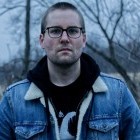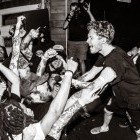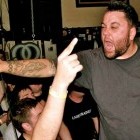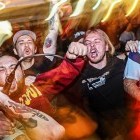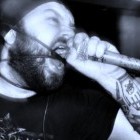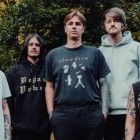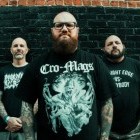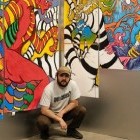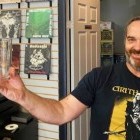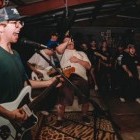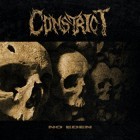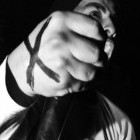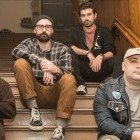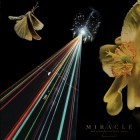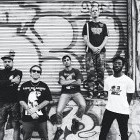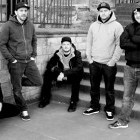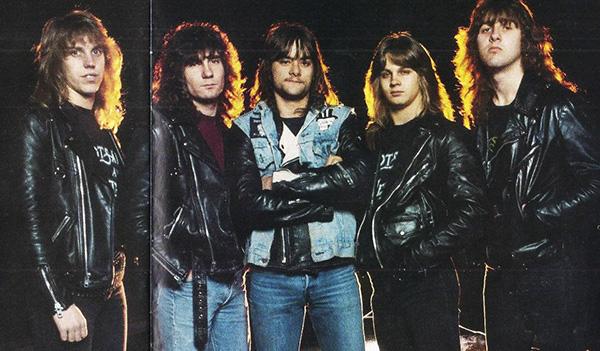
Troy Gregory has been a working musician for over four decades. Since the late '80s, the multi-instrumentalist has recorded with such artists as The Dirtbombs, Crime and the City Solution, Swans, Kim Fowley, and Denise James. I first became aware of Gregory during his two-album stint as the bassist of Arizona thrashers Flotsam and Jetsam on No Place for Disgrace (1988) and When the Storm Comes Down (1990). Replacing Jason Newsted was no easy feat, but the bassist held his own, ultimately becoming one of the chief songwriters of the band before departing.
After exiting Flotsam and Jetsam, Gregory joined New York City metal power trio Prong. The band would go on to release 1991's Prove You Wrong, one of their best-selling albums. After his time in Prong, Gregory moved back to his home state of Michigan where he's remained since, working nonstop since the '90s.
A longtime fan of his work, I reached out to Gregory to talk about his time in the heavy metal community.
First off, I'd like to start with your upbringing. From what I've gathered from what I've read online, you were born in the Detroit area in the mid to late '60s.
Yes, I was born breech at 6:35am in the morning on the 13th of November, in Detroit, the year of 1966. By the age of three I figured out how to use the record player and investigated every record in the house. I loved singing along and jumping around the room acting out the songs. Babysitters would bring records and comics to keep me occupied and out of their way.
Stylistically speaking, your discography is all over the place. There's rock, metal, industrial, etc. Have your musical habits always been so varied?
I became so obsessed with music at such an early age that genres didn't and still don't exist to me, only music that gets my inner attention or not. Music was personal, and not a social or cultural thing for me, so the landscape was wide open. Still is. The Beatles' music was all over the place in musical feels, and I believe that had a massive impact on me because I loved them so much.
SEE ALSO: Best Thrash Ballads
What was the first band you played in that made some kind of noise?
It was during the summer before 7th grade, in my friend's basement. We called ourselves The Archives and played songs by Led Zeppelin, Hendrix, Black Sabbath, The Who, Ten Years After, Talking Heads, and Devo. We played the Beer Junior High talent show. Mike Alonso, who now drums for Flogging Molly, was in that band; as well as Matthew Smith, who I recently played with in Crime and the City Solution.
At some point you moved from Detroit to Los Angeles. What brought that on?
After I graduated, I played the bars in Detroit for a while, but then decided to go to Musicians Institute in Hollywood to study and start living on my own. I had never been to California before and knew no one at first, so it was a very exciting time for me.
SEE ALSO: 5 Forgotten Shrapnel Records Albums Worth Revisiting
Then you became a member of Wasted Youth for a spell. Was that when Joey Castillo was still in the band? How did you hook up with them?
Rick Seccombe from Wasted Youth was going to G.I.T as well. I met him in the hallway after noticing a sticker of the band Fear on his guitar. He told me they were looking for a bassist. And, yes, Joey Castillo [also of Sugartooth, Danzig, Queens of the Stone Age, and countless other killer bands] was the drummer. I rehearsed and wrote with them, but I was still studying at the school, so I quit the band to focus more on my studies. Their album Black Daze has two songs I co- wrote the music for, but alas I am not nor have ever been credited. It was a lot of fun and they were super nice guys, though. Chet Lehrer may still be one of the funniest guys I ever met. The band had parties more than rehearsals. I was still very green and naïve about life in general.
I would love to hear how you got to audition for the bass gig in Metallica after Cliff Burton died.
I didn't have an audition, I had no idea how to even go about getting one. So, it wasn't something on my mind. A guy I knew from B.I.T. named Scott Earl, from Culprit and TKO, had the audition. I helped him prepare for it and he asked me to drive up with him to San Francisco. I just went to the audition with him and was not even thinking of auditioning myself, or even prepared to do so. I struck up a conversation with a guy that worked at the studio who said he had a weird feeling about me and insisted that I try out (he even brought me a bass to use since I did not have one with me). I was 19 but looked 15, other guys there were laughing at me. After Scott was finished and saw me in line with the bass he rolled his eyes, " Oh, you're going to audition now?" "Why not?" I said. Then a guy comes out and announces they are only taking one more audition and then they are done for the day. Scott looked at me like, tough luck, let's go. I don't know what made me do it, but I screamed at the guy from the back of the line that, "If these motherfuckers don't audition me then they are making a big mistake!" He laughed and told me to hold on a second and he disappeared back behind the door.
Meanwhile, all the other guys are glaring at me with anger and the guy pops back out and tells me to come on in. The guys in Metallica kept asking for my ID because I didn't look my age. We played the two audition songs first, which were "Master of Puppets" and "Welcome Home (Sanitarium)." They said they dug it, and then as I was leaving a guy came out to the parking lot and asked if I could come back in. They asked what else I knew how to play and so we did "Creeping Death," "Whiplash," "No Remorse," and, I think, a small portion of "Trapped Under Ice." I think a few other tunes, but right now I can't remember.
Were you confident at that point?
I played well and impressed them enough that Lars Ulrich gave me his number to talk for a few days. Then, just before they were going to fly me back to audition again, Lars told me that they picked someone. I had just started Musicians Institute so I wasn't distressed about it. It was a lot of fun, especially considering that I pretty much improvised the entire audition. I think my age and my hyperactive mouth didn't help matters much, plus they all gasped when I was offered a beer and I told them that I didn't drink. I was a very straight kid at the time, although it was not long after that I discovered my love for the dive bars in Hollywood. So, I went back to studying as I set out to do when I started at Musicians Institute. That is where my head was at, but it was a happy and surreal day and such an innocent memory for me. I recently ran into Lars because I was playing bass with The Dirtbombs and we did the Orion Festival here in Detroit. He completely forgot about me until I reminded him. So, I never actually had a proper audition, it was all off-the-cuff and yet they were impressed enough to consider me. I wonder how it would have played if I actually prepared for it?
How did you go from there to joining Flotsam and Jetsam?
I didn't join Flotsam until about a year after that. I had graduated from Musicians Institute and just got fired from working in their library. I was walking to a comic book shop on Melrose and saw Dave Mustaine walking into Music Grinder Studios. I heard Chuck Behler joined them on drums and I had played with him twice in Detroit, so I knocked on the door to say hi. He suggested me to join Flotsam. They had the same management [Q Prime] and were going to tour together.
SEE ALSO: In Defense of Metallica: Stop Shitting on Them Already!
Was Flotsam and Jetsam signed to Elektra Records at the time you joined the band? Did you get along with the guys right off the bat? I wonder about your personalities and how it all gelled in that respect.
Yes, they had been signed to Elektra already. So, I missed out on any signing bonuses [laughs]! We all did get along quite quickly. They are all friendly and are down-to-earth cats. Everyone in that band had distinctly different personalities from each other. At first I lived with [drummer] Kelly Smith and that didn't work out well, and not because of him. He was very straight and deeply into Narcotics Anonymous and had a steady serious girlfriend, and here I am his roommate who was a heavy drinker and single and finally meeting girls. I am sure that I was a royal pain in the ass for him. Kelly and I sharing a flat was The Odd Couple, yet we did get along extremely well the majority of the time. But Flotsam was their band and their personal passion. Most suggestions that I had for the group compromised too much of what their vision was, and that is understandable.
Do you look back at the recording sessions for No Place for Disgrace fondly? I know Michael Alago A&R'd that album.
I always had the feeling Michael didn't like me. He really missed Mike Spencer. It makes sense that Spencer is now spearheading the group. The album was exciting and fun to make, because it was the first time I had been in an actual recording studio. Before that, all I used were 4-track machines. It was at the Music Grinder where I had run into Megadeth a few months before. Bill Metoyer recorded that album and he was such a great guy to work with.
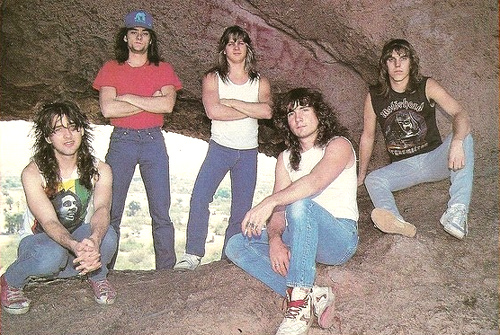
You have a co-writing credit on "Misguided Fortune," one of my favorite songs on that album. Why didn't you have more material on there?
Most of that album was already written when I joined.
Were you listening to a lot of thrash at that time? I'm interested to see what you thought of the band's contemporaries.
There were many bands that I liked in that genre. Metallica, Celtic Frost, Voivod, and Mercyful Fate were favorites in that category. I liked a lot of bands that we did shows with, including Megadeth, Testament, Sanctuary, Forbidden, Vio-lence, and the band Meanstreak who [ex-Dream Theater drummer] Mike Portnoy's wife played in. They were all very nice people. I never had a steady diet of a certain musical mood, so I tended to enjoy the metal groups that had their own distinct style and were a bit more progressive and original. Sacred Reich became good friends.
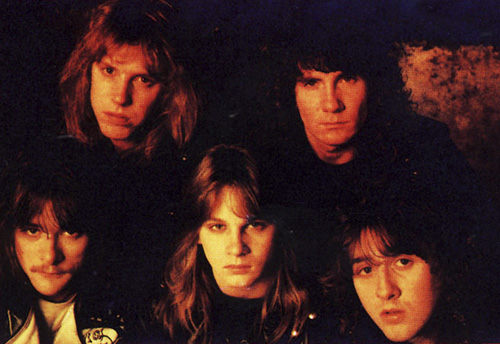
One of the tours Flotsam and Jetsam went out on in support of the album was with Megadeth. On a behind-the-scenes level, was that tour as over-the-top as one would expect for that era?
That was the first time I ever toured Europe and the largest audiences that I had ever played to at the time. For a kid that spent most of his youth in his bedroom learning how to play [Yes'] Tales From Topographic Oceans, I was having a blast. I was naïve to the Megadeth drugs going on at that time. I stayed out all night every night with locals I had met and did a lot of sightseeing. It was pretty innocent and harmless debauchery on my part. I was thrilled to just be able to play every night in another country. It was a dream come true. I was constantly wound up with energy.
For the next album, When the Storm Comes Down, you guys signed with MCA Records. What happened with Elektra? Were you paying close attention to the band's business dealings, or were you strictly focusing on the songwriting and performance side of things?
I was not into the music business end of it at all. Perhaps the biggest detriment to my music career has been my disinterest and discontent for the music business. I have always been broke, but I perfected getting by on a poor man's wages. The label can keep you on the road, but after a tour there is nothing unless you saved your $10 a day per diem. So, I got a job at a record store in Phoenix around the time of writing the Storm... album. I even lived in the rehearsal space in a storage facility for a while. Sleeping on top of drum cases and no hot water from the sink. I brought the guys from Voivod there after a gig they played and Piggy and Away jammed with me on "Ziggy Stardust" and some King Crimson. My attention is always to the music and performance, yet it would be nice to support my family as a musician. Someday, perhaps.
SEE ALSO: Albums We Love: Flotsam and Jetsam, When the Storm Comes Down
I know I'm in the minority here, but I think When the Storm Comes Down is the best Flotsam and Jetsam album. One of the reasons for that are the lyrics, which you had a huge part in writing. Reading them, it seemed like you were in a very strange headspace at the time.
I was spending a lot of time alone reading and writing stories. I had just discovered James Joyce and William S. Burroughs and was really into their work, which I know influenced a lot of that writing. Also, at that time, I was starting to look into the endless schools of thought found in theology and science. I also started writing songs that were in no way appropriate for Flotsam, and it was frustrating to me. Inner and global turmoil is a big theme of that record.
I interviewed Kelly Smith back in 2009 and when I asked him which Flotsam and Jetsam album he felt was largely misunderstood by the general public, he said it was When the Storm Comes Down. He also said the following: "I, like many others, had focused on the music and playing on the record, but the lyrics that Troy Gregory had written were very wordy and strange. Troy was into a different vein of music... more obscure and dark. There was a lot of turmoil in and around that record." I would love to hear your thoughts on that.
Yes, and the lyrics were even more abstract at first, so they asked their road manager, Eric Braverman, to make them a bit clearer and more normal. I disliked changing them, yet they were right about them not being appropriate for Flotsam. Sadly, I didn't care and lost interest in being part of the group at the time. Not because of them, it was because I was so down on myself and did not think it was fair for me to stay in the group when it meant so much to them. I became incredibly careless, reckless, and even more weird. Not to say it was all bad—and when it was those were only minute, random problems—no one seemed to stay mad at each other for very long, and the bunch were quite forgiving fellows. It was a fun album to make, the tour was great, and we had some very good times together.
What finally made you leave Flotsam and Jetsam, and did you move away from Arizona at that point?
I decided that I wanted to focus on writing more and wanted to start a band to play the songs that I had been writing. I wasn't into the group anymore and I didn't want to fake it. I did like them all, but didn't think they needed me around gumming up the works. Really, I was bringing in music that was more like The Residents, Can, or The Birthday Party, but it wasn't their thing. As I said, it was their vision and fair enough. I said goodbye and I moved back to Los Angeles for a short time, then Portland, and then back to Detroit to start a band with Matthew Smith. I have no regrets other than I insecurely said rotten things about them after I quit. That was totally uncalled for. I projected my own dissatisfaction on them, which is an empty gesture. They were all good friends at a time in my life, and I would love to see them again someday and wish them well. Every now and then me and [guitarist] Michael Spencer write each other on social media.
How did you become a member of Prong? Now you're talking about a NYC-based band. I've always wondered how that ended up happening.
I was back in Detroit starting a band and hanging out in my parent's basement, back on the 4-track machine, recording. It may have been almost a year or so after I quit Flotsam that [Prong guitarist/vocalist] Tommy Victor called me up and asked me to come to New York City and join Prong. Prong opened up the last Flotsam tour and we became friendly and shared an obsession with Killing Joke and a common sense of humor.
The album you made with Prong, Prove You Wrong, ended up becoming one of the band's most popular albums, but there were some stylistic challenges taken on it. What was the creative vibe like going into the studio, and how was working with Mark Dodson?
Mark Dodson was great to work with and he had a wicked sense of humor. Tommy, Ted, and I were definitely leaning more towards our inspirations from Chrome, Bad Brains, The Stranglers, and, of course, Killing Joke when we were writing Prove You Wrong.
SEE ALSO: 10 Cover Songs That Surpass Their Originals
There is some really interesting bass and drum work on that record. Ted Parsons is such a talented drummer who writes intricate parts, but there's an economic and tasteful way about everything he did during his time in Prong.
Playing with Ted was fantastic. His style comes more from dub reggae and dance music. He is spot on the meter. I know he felt I over-played quite a bit, but that is because I did. My favorite bassists are Geddy Lee and Chris Squire, so I tend to play quite busy. But I loved locking into those grooves.
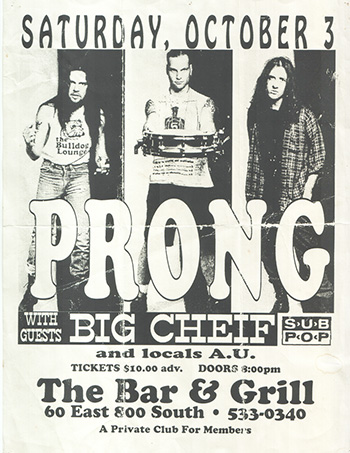
Why did you part ways with Prong? Did it have anything to do with the band very much being Tommy Victor's baby, so to speak?
In a lot of ways it was the same thing that hapened with Flotsam, in the sense that I was writing songs that I loved that were not right for Prong. Tommy is Prong, obviously, and he is still successful with it. Also, personally speaking, I was going through quite a bit of a metamorphosis in my brain about life in general. Prong worked so much that I rarely had a substantial place to live in New York, so I stayed on people's couches and floors quite often. To not be a pain in the ass to whoever was allowing me to crash with them, I would tend to stay out all the time, and I did. Most of my time in that group was walking around New York by myself and hitting every bar. I was drunk all day and living off the food they sell you on the street. Living like that and not sleeping much was making me delusional and in a crazy fog. People thought I was on hard drugs, but that was never my thing. My fretting hand started getting weird and cramping up, which I completely believe was psychosomatic.
I didn't want to leave the band, but I knew that I had to. I was so weird that I told the mangement I was leaving because I pissed off a hate group. I have no idea why I made that up and said that to them, they were nice guys. I was just ridiculous. I would go to bars and pretend that I was someone else, sometimes I pretended that I couldn't speak English. In retrospect, I allowed my identity to be fractured. I knew I had to sort myself out, and that meant going back home to Detroit and picking up with the band I started before I joined Prong. That band eventually became The Witches, a band I have done now for about 20 years on and off, but right now off to focus on only solo works. I taught myself violin and cello and also honed in my drumming, guitar playing, and piano. Singing is what I love best. It is my favorite and most natural way for me to communicate.
Not very long ago, Tommy asked me to do a tour with them and I would have done it, but I was recording with Crime and the City Solution at the time. It would be cool to see him again, it seems I always miss him when he plays in Detroit.
You did some bass session work on Swans' Love of Life album in 1991. Ted Parsons also played on that record. Was he your connection to that circle? What was that experience like?
I did that album while still in Prong. I met [Swans guitarist/vocalist] Michael Gira through Ted. Michael and I would hang out and drink at 7B Horseshoe Bar quite often. My friend, Matthew, was supposed to play bass with him, but Michael heard a demo from Matt with me playing on it and he liked how I played. He had me play on three songs at Martin Bisi's studio. I used to listen to Swans a lot just out of high school, so I was quite excited to do it. I did some shows in Australia about two years ago and saw Swans play on a day off and they were just fantastic. I love that last album [2015's The Gate].
I've read that you toured as Killing Joke's bassist in the mid '90s. Jaz Coleman is such an intense performer, but how is he to work with from an inside the band perspective?
Working with maestro Coleman was quite an experience. I loved the conversations we would have about life, the universe, and everything. [Killing Joke guitarist] Geordie [Walker] got me in the band for that tour that Youth couldn't do. Geordie is one of my favorite guitartists and I was a huge Killing Joke fan. Being able to do that tour was a gratifying experience not lost on me. If you would have told me in high school that I would one day play with Killing Joke, I would not have believed you. It was an incredible experience, the shows were just amazing.
You're one of the busiest musicians around, and you've been that way for decades now. Do you ever miss playing "heavy" music?
I have never stopped playing. It's always strange for me when people ask me if I am still doing music. I never stopped. Doing the independent route doesn't get your music in many homes, but I do exactly what I want creatively. I have a new song that has seven parts and is over two hours long, no record company I ever dealt with would allow that type of shenanigans. I think there are elements of what I like about metal that show up in various degrees in music I write from time to time. Although I don't consider Black Sabbath a metal band, they obviously were a deep root to what became metal, and Sabbath are a huge influence on me. Their "psychedelic " side is what I love the most. Sabotage is my favorite album of theirs. I did some recordings a few years back with my friend, Paul Torakis, who is a total metalhead and that's what the music was. Mike Alonso played drums on it. I do an improv group with my brother sometimes called The Rotor, and it is probably the most heavy, noisy music I have ever made.
I honestly do not miss playing to a strict metal crowd, seeing some kid get his face bloodied by some violent bully every night is a drag. I grew up getting into fights and being bullied and don't do well with violence and confrontation at all. I am honestly a very gentle, peaceful person. I love to see a Slayer concert, but being in that type of crowd is just not for me. Perhaps I am too much of a pussy. I am quite sensitive, I suppose, I won't read reviews and certainly do not read comments sections, because I don't want my feelings hurt. Also, at 49 years old, I do not feel any connection with that vibe even though it can be cathartic for many folks. Not everyone in a metal audience is like that, of course, many are having a good time and the music means so much to them. However, you cannot deny that feelings of hate and anger play a large part in the machinery of what constitutes metal, I know there are many exceptions to that, though. It's redundant to generalize as I can only go from my own personal experiences and what it was for me, but of course not everybody else. I like a diverse audience of people to perform for, and I still have metalheads with a wide array of tastes come to my shows.
I was teaching at a School of Rock a few years back and did an all-metal show. It was a blast teaching them to play "Piranha," by Exodus, and "Black Metal," from Venom. I suppose the music that ignited metal is closer to me—as I said before, Sabbath, but also Blackmore's Rainbow, and, of course, Motörhead. I went and saw Iron Maiden recently and I had happy tears in my eyes when they played. I met Steve Harris when I was kid and we talked about how much we loved old Genesis. Plus, I had so much fun learning his basslines. It gives your right hand fingers a nice workout. I recently have been digging a metal band called Year of No Light. I just like music, and if it happens to be metal or not then that is just how it is. Most metal I do hear is too derivative of someone else's bag to get my attention. I think Opeth is unique and I am sure there are quite a few great bands that I am just not hearing, or fantastic metal groups that don't have any kind of record deal or following but are tearing it up like nobody's business somewhere on a stage tonight. I have a feeling there are thousands of groups like that around the world in every genre.
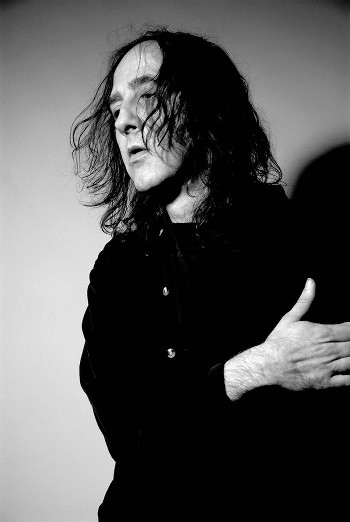
Are there other musicians in the Detroit garage rock scene we might not know are old school metalheads?
Everyone I know enjoys some form of metal. Mick Collins from The Dirtbombs (who I have played with for about nine years, on and off) told me that Prong was an influence on him forming The Dirtbombs after he did The Gories. John Nash from Electric Six, who used to play in The Witches, was in an Iron Maiden tribute act when he was just out of high school. In my solo group I have covered "The Hammer," by Motörhead, and used to do a bit of "Heaven and Hell" in the middle of one of my songs. On the last tour The Witches did in Canada, we played a bit of "Seek and Destroy" one night mixed with Kraftwerk's "The Model." The band Wolf Eyes, from Detroit, have a metal overtone to them at times. Almost everyone I know has a fondness for Slayer. It was Mike Alonso who got me into metal groups back in the early '80s. I was much more into what was being called new wave and prog rock, but I did enjoy quite a bit of metal acts. I saw Exodus the first time they played Detroit and they were great. It's all music—all vibration—as Zappa said, it is sculpted air. The labeling and demographics of music is not music. As for all these questions, I can only speak truthfully for myself. It is ridiculous for me to generalize or suppose what it means to anybody else. Most of everything if not all I believe to be illusory to the point of incomprehension.
Thinking back on your time in both Flotsam and Jetsam and Prong, can you pick one song from each band you feel most proud of and why?
For Flotsam and Jetsam I would have to say "Burned Device," because I may have been the first person to write about cell phones in a song before they became apparent. Plus, it has more of a prog overtone to it. We all liked Rush, that was a group we all could agree on. "October Thorns" was a riff that Mike Gilbert invoked and felt really good to play. Eric A.K. has a great vocal in "Escape From Within," and the breakdown of "No Place for Disgrace." That song had a really powerful vocal and melody that he nailed every night. I liked the guitar harmonies that Ed and Mike would come up with. Kelly is a very underrated drummer, his drumming on "Greed" I remember being particularly stellar.
For Prong, I loved singing "Hell If I Could," and I love the riff Tommy plays. "Pointless" was always a gas to play. In the middle of "Territorial Rites" is a bassline melody totally inspired by [Genesis guitarist] Steve Hackett. I love Ted's drumming, especially on "No Way to Deny It." I think that may be my favorite song on that record. And even though I didn't record them, I loved playing "Beg to Differ" and "For Dear Life" at our gigs. The Chrome cover of "Third From the Sun" as well.
Sorry, I couldn't pick just one. Flotsam and Prong are great bands and I have zero regrets and only gratitude to have played music with those fine people, as well as performing for their audiences that enjoy their music and continue to do so. Both bands have proven their staying power and are going strong with fresh material. For myself, I am always doing music no matter how low on anyone's radar I am flying. I throw it up on the internet, and sometimes I take it right back down. Music is more than art to me, and that is saying quite a lot. I'm foolish and at times ridiculous, but that's just my human side trying to get my electrical spirit's attention. I hope people enjoy this article and that I did not offend anyone. I am like the opposite of that Kanye singer guy when it comes to modesty, so, I thank you, Carlos, for noticing I am fuckin' brilliant [laughs]. Happy thoughts...
***
Head to Troy Gregory's Bandcamp page to check out more of his solo work.

